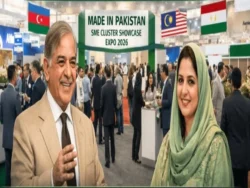Saudi Arabia’s development ambitions present huge opportunities for Pakistan

23 December 2023
Published in: Business Recorder
When speaking of developmental change in Saudi Arabia, a narrative unfolds that holds space for proactive endeavors originating from Pakistan. Positioned as a vital bridge connecting the two nations, Pakistan’s role becomes significant in not only catalyzing new opportunities but also fostering collaborations that transcend geographical boundaries.
From the details of Vision 2030 to the visionary NEOM project, the ambitious Red Sea endeavor and strategic economic zones, there is a need for discourse on the unprecedented transformation unfolding in the Kingdom and the opportunities it presents for Pakistan. Today, Riyadh is the most happening place in the world as far as investments and economic development are concerned.
During the time I was Pakistan’s Minister for Investment, I seized the opportunity to engage with Saudi leadership, orchestrating a total of 18 meetings focused on investment prospects. The objective was clear — to encourage KSA to consider substantial investments in the promising economic landscape of Pakistan, which can comfortably gain a few billion dollars’ worth of investment annually from KSA on a sustainable basis.
Saudi Arabia is on a transformative journey, driven by its ambitious Vision 2030 initiative. From massive infrastructure investments to pivotal economic reforms, the nation’s trajectory reflects a commitment to sustainable growth, innovation and global prominence. Over the next two decades, the world will witness a complete metamorphosis of KSA in all facets — from infrastructural development to cultural evolution. Saudi Arabia will be a powerhouse in every sector of their economy.
A significant aspect of this transformative vision is Saudi Arabia’s successful bid to host the World Expo 2030 in Riyadh. They have engaged the best global resources for planning and designing the overall roadmap for the global event.
Recently, at KSA’s first-ever annual investment meet-up in Asia– the Asia Future Investment Initiative (FII) Priority in Hong Kong– the gathering emerged as a crucial platform featuring the participation of global investors from 45 countries with a notable 90% hailing from Asian nations. This served as a pivotal opportunity to delve into the intricacies of investment inflows and outflows surrounding Saudi Arabia.
Pakistan needs a charter for business for the next 20 years with sanctity as crucial as that of a constitution.
Muhammad Azfar Ahsan
The anticipated surge in PIF’s project CapEx, from USD 70 billion in 2023 to USD 175 billion annually between 2025-2028, signals a substantial boost to the non-oil GDP. Against this backdrop, top investors from diverse nations, particularly Asia, provided a comprehensive briefing to the Saudi leadership on investment opportunities.
The Saudi Arabian commitment to development is exemplified by its substantial capital expenditure plan, earmarking up to USD 0.9 trillion over the next decade. A focal point of this plan is the Expo 2030 initiative, where Riyadh takes center stage as the host city. The allocation of 1% of the overall CapEx to Expo 2030 underscores its significance in the broader scheme of large-scale projects.
The robust credit demand in Saudi Arabia is underscored by the pipeline of un-awarded projects, estimated at USD 1.1 trillion. PIF’s substantial investment plans contribute significantly to credit demand, with local banks, especially corporate banks, positioned for growth.
Mega projects like Al Ula, the Red Sea Project, NEOM and The Line are going to be instrumental in transforming Saudi Arabia’s landscape. These projects, with their focus on sustainability, luxury tourism and technological advancements, contribute significantly to economic growth and job creation.
In the tumultuous landscape of Pakistan’s economic scenario, the recent withdrawal of major players like Shell and Telenor speaks volumes about the deficiencies in our short-term policies. This stark reality serves as an urgent wake-up call, signalling the dire need for a profound shift towards robust, long-term strategies that can resuscitate investor confidence and stimulate both domestic and foreign investments. Among these challenges, it is imperative to acknowledge the reality that Saudi Arabia, while serving as a beacon of hope in terms of successful models of transformation, is no longer ready to collaborate based on aid and subsidies.
Pakistan needs a charter for business for the next 20 years with sanctity as crucial as that of a constitution. This charter must have the stamp of the Parliament and the National Security Council. It needs to be above any political change or bias. The planning must be fool-proof, including the will and vision of all stakeholders, covering the ‘investment climate’ with future projections and margins for disruption. The objective of policymaking needs to be facilitation for investors and enhancing the attractiveness of Pakistan as the best investment opportunity.
There is a need for an overhaul of the system and massive restructuring of institutions such as the Board of Investment (BOI), the Privatization Commission and a few others. Pakistan’s BOI remains non-performing, not only because of the lack of permanent leadership but also due to an obsolete inherent infrastructure that has inbuilt delays for the recruitment of competent teams and quick decisions.
The ‘BOI Ordinance’ requires amendments to enhance its productivity, enabling the recruitment of the best talent from across the landscape. In my opinion, the real and long-term solution is the robust restructuring and empowerment of the BOI, like our counterparts in the CARs, ASEAN, and ME. The BOI must become an agile, standardized, one-window operation for investors, as that will guarantee continuity, transparency and accountability.
The only visible difference between the BOI and the Special Investment Facilitation Council (SIFC) is the official role of the military and the induction of senior military officials into the SIFC. Instead of positioning the BOI as a separate entity with a distinct council controlling its affairs, it would be better to have the military collaborate with the BOI. This collaboration can facilitate investments from GCC countries, closing the loop with the completion of projects. The same structure can also facilitate other countries.
I recognize a potential interest from Saudi Arabia’s leadership in investing in Pakistan. To capitalize on this opportunity, it’s essential to present them with well-defined projects supported by comprehensive feasibility studies. In this context, I believe in the principle that investors must be encouraged and facilitated, and investment must be grasped at the ‘right time.’ Investment is like water; it flows away if not productively engaged within the stipulated time. It is incumbent upon us to proactively leverage this opportunity, presenting compelling projects across various sectors to secure a substantial share of investments.
The acknowledgment extended to the leadership of Saudi Arabia, and particularly Crown Prince Muhammad bin Salman is not merely a formality but a recognition of a transformative vision that can serve as a guiding light for Pakistan’s metamorphosis.





